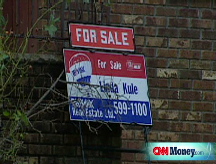Fannie's loss: $29 billion
Continued problems in housing market continue to drag down government-controlled mortgage finance giant.
NEW YORK (CNNMoney.com) -- Troubled mortgage-finance giant Fannie Mae reported on Monday that it lost $29 billion in the most recent quarter, putting the firm closer to having to draw on the $100 billion in taxpayer dollars committed to it in September.
Fannie Mae (FNM, Fortune 500) said that as of Friday it had yet to draw on those funds. But the company warned in a filing that "if current trends in the housing and financial markets continue or worsen...we may have a negative net worth as of December 31, 2008."
In that event, Fannie said it would need to tap into an unspecified amount of those taxpayer dollars.
The company would not comment on whether it had started to receive those funds as of Monday, and a spokeswoman from Treasury had no comment on the Fannie results or the filing.
Much of the loss was due to a $21 billion non-cash charge related to how it accounts for tax credits it had been carrying on its books - Fannie is no longer confident it will make enough money in the future to allow it to use those tax credits.
The company would not estimate what the loss would have been without the charge. But it appears that the other losses would have been weaker than in past periods, and worse than expected.
With more loans in default, credit-related losses soared to $9.2 billion from $5.3 billion in the second quarter and $1.2 billion a year earlier.
The overall loss came to $13 a share, far worse than the $2.3 billion, or $2.54 a share it lost in the second quarter. A year earlier, Fannie lost $1.4 billion, or $1.54 a share.
Analysts surveyed by Thomson Reuters had forecast a loss for the quarter of only $2.5 billion, or $1.60 a share.
Just about every measure of the status of the mortgage loans Fannie Mae owns or backs grew worse in the past quarter.
The company took a $1.8 billion hit on the reduced value of its mortgage securities that were backed by subprime or Alt. A loans, those that were made without full documentation of a borrower's income.
And the losses are poised to climb higher. The amount the firm has set aside to cover bad loans has shot up 75% in just the past three months to $15.6 billion.
The value of loans that are "non-performing" or in foreclosure shot up 37% over just the past three months to $71 billion as of Sept. 30. Its inventory of foreclosed single-family homes now stands at 67,519, up by more than a thousand homes a week during the quarter, and a little more than double the number of foreclosed homes in in its inventory a year ago.
The company says it expects that home-price declines will be at the upper end of its forecasted range, between 7% and 9% this year. It added that the total decline from the peak of home prices to the low point sometime next year also will be at the upper end of its forecasted range, between 15% and 19%.
But the way that Fannie calculates price declines produces a more modest drop than other measures, such as the widely-followed S&P/Case-Shiller price index.
Using that measure, and including the impact of the price of foreclosed properties on overall prices, Fannie calcuates it will see prices fall between 12% to 16% this year alone, and that the overall decline from peak to bottom will be end up being a 27% to 32% plunge in home values.
The Treasury Department took over control of Fannie Mae along with rival Freddie Mac (FRE, Fortune 500) on Sept. 7, after it concluded the firms were facing rising losses from mortgage-backed securities.
The two firms together control or guarantee about $5 trillion in mortgage loans, and they have become nearly the only financial institutions able to bundle loans together into securities that could be sold to investors.
Their ability to continue to do so has become a crucial source of funding for banks and other mortgage lenders, which need to sell the loans they make in order to have the funds to make additional loans.
The two firms were set up by the federal government, even though they were owned by shareholders.
In July, Congress voted to give Treasury authority to pump unlimited amounts of money into Fannie and Freddie, a move that the firms and Treasury Secretary Henry Paulson said at that time they believed would be unnecessary.
But in September, with the threat of mounting losses, Treasury had to put the firms into conservatorship, a form of reorganization similar to bankruptcy, as it announced it stood ready to use taxpayer dollars to cover further losses.
The move was the first of a series of federal bailouts of the nation's top financial institutions in response to the crisis in credit and financial markets. ![]()


